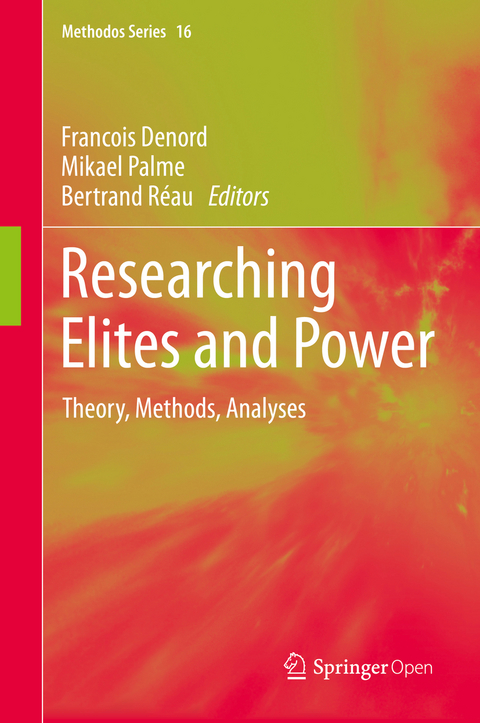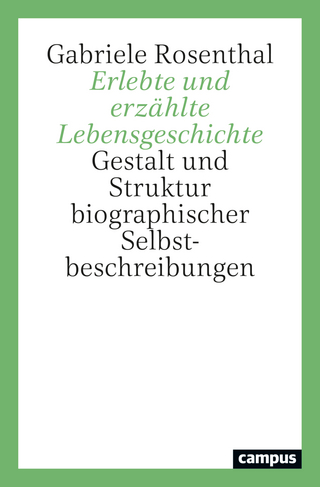
Researching Elites and Power
Springer International Publishing (Verlag)
978-3-030-45174-5 (ISBN)
This open access book describes how elite studies theoretically and methodologically construct their object, i.e. how particular conceptualizations of elites are turned into research practice using different methods for collecting, dealing with and analyzing empirical data. The first of four sections focuses on what Mills named the power elite and includes Bourdieu's field of power. The second section addresses studies of the domain of economic power, whereas the third section centers on research on elite education. The fourth and last section highlights research on symbolic power, either within social fields or as a dimension of social structure at large, areas where recognition is essential. All sections comprise empirical case studies of elites and power, whereby each of which makes explicit the various methodological choices made in the research process. Through focusing on methodological approaches for the study of elites and power and on how such approaches relate to each other as well as to the theoretical perspectives that underpin them, this book will be a valuable source for social scientists.
Mikael Palme is Associate Professor in Sociology of Education at Uppsala University. Oriented towards the sociology of education and culture, his research includes ethnographic as well as quantitative studies of Swedish secondary and higher education, especially elite education. Along with Donald Broady, he was one of the early introducers of Pierre Bourdieu's sociology in Scandinavia. Bertrand Réau is Associate Professor in sociology at the University of Paris I - Sorbonne. His current research interests focus on economics, cultural practices, job and employment. His recent published papers and works are on the following topics: tourism activities and social consumption of space and place, the globalization and the rearrangement within various social science disciplines around the category of "Studies", the relationships between tourism and ethnicity in Southeast Asia, the extension of theme parks in the world. He is the author of Les Français et les vacances. Sociologie de l'offre et des pratiques de loisirs (2011). As a co-author, he published, together with Saskia Cousin, Sociologie du Tourisme, (2011) and La sociologie de Charles Wright Mills (2014), together with François Denord. François Denord is a sociologist and a researcher at Centre National de la Recherche Scientifique (CNRS, CESSP, Paris, France). He teaches at Ecole des Hautes Etudes en Sciences Sociales (EHESS) and University of Paris 1 (Sorbonne). His researches focus on the dynamics of the power structure and political ideologies in contemporary France. He is the author of Neo-libéralisme version française (2007, 2016) and the co-author of L'Europe sociale n'aura pas lieu (2009), La sociologie de C. Wright Mills (2014) and Le concert des puissants (2016).
Chapter 1. Introduction.- Section I: The Power Structure.- Chapter 2. The Power Structure and Membership Network Analysis.- Chapter 3. The field of power and the division of the labour of domination Handwritten notes for the 1985-1986 Collège de France lectures.- Chapter 4. Constructing a Field of Power. Reflections based on a Norwegian Case Study.- Chapter 5. The craft of elite prosopography.- Chapter 6. Legitimacies in Peril: Towards a Comparative History of Elites and State in Nineteenth and Twentieth Century France and Western Europe.- Section II: Economic Power.- Chapter 7. Researching national and international top managers. An interview with Michael Hartmann.- Chapter 8. Central bankers as a Sociological Object. Stakes, Problems and Possible Solutions.- Chapter 9. Firm's political connections and winning public procurements in Canada.- Chapter 10. Consultants and economic power.- Chapter 11. Fête in the factory. Solemnity and power among Porto's industrialists (1945-1974).- Section III: The Formation of Elites.- Chapter 12. How should historians approach elites?.- Chapter 13. How can we identify elite schools (where they do not exist)? The case of Ireland.- Chapter 14. ''In our school we have students of all sorts'. Mapping the space of elite education in a seemingly egalitarian system.- Chapter 15. The internationalization of elite education. Merging angles of analysis and building a research object.- Section IV: Symbolic Power.- Chapter 16. A sociology of the dominant class. An interview with Monique and Michel Pinçon-Charlot.- Chapter 17. When moral obligation meets physical opportunity. Studying elite lifestyles and power in the Saint-Tropez area.- Chapter 18. The social closure of the cultural elite. The case of artists in Sweden, 1945-2004.- Chapter 19. How to study elites' "international capital"? Some methodological reflections.- Chapter 20. Is a participant objectivation of elites and symbolic power possible?.- Chapter 21. Conclusion.
| Erscheinungsdatum | 17.08.2020 |
|---|---|
| Reihe/Serie | Methodos Series |
| Zusatzinfo | XII, 276 p. 23 illus., 7 illus. in color. |
| Verlagsort | Cham |
| Sprache | englisch |
| Maße | 155 x 235 mm |
| Gewicht | 600 g |
| Themenwelt | Sozialwissenschaften ► Soziologie ► Empirische Sozialforschung |
| Schlagworte | Economic Power • elite education • Geometrical Data Analysis and regression analysis • Monetary Policies • Network analysis and social space analysis • open access • Pierre Bourdieu • power structures • qualitative methods • Quantitative Methods • Symbolic power and life styles |
| ISBN-10 | 3-030-45174-7 / 3030451747 |
| ISBN-13 | 978-3-030-45174-5 / 9783030451745 |
| Zustand | Neuware |
| Informationen gemäß Produktsicherheitsverordnung (GPSR) | |
| Haben Sie eine Frage zum Produkt? |
aus dem Bereich


